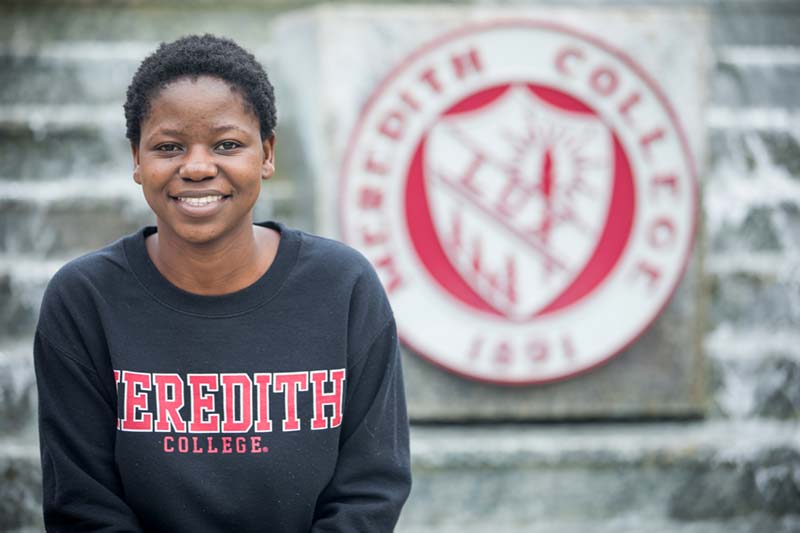
When Matilda Odera, ’18, talks about her Meredith experience, she lights up. Whether she’s describing the friends she’s made across campus, her undergraduate research, or her involvement in A4E, Meredith’s student environmental organization, it’s clear that she has made the most of her time in Raleigh.
Originally from Busia, Kenya, Matilda grew up in Nairobi where she drew on one of her primary strengths, adaptability, from an early age. As a five-year-old she had to leave her parents’ home in order to pursue her education.
“Adaptability is something I built growing up – being able to handle different situations is something that I think makes me strong. Even now, I’m always putting myself in different spaces – I’m growing this strength every day.”
A Zawadi Africa student, Honors Scholar, and double major in biology and environmental sustainability, Matilda has sought out opportunities to combine her two passions of promoting diversity and raising awareness about the environment, particularly through A4E and the Meredith International Association (MIA). She enjoyed organizing events that involved the larger Meredith community and beyond.
“When so many people are interested in learning what you care about it’s really inspiring. I feel like you can never raise enough awareness about these issues.”
One of the efforts she is most proud of was a collaboration between Meredith and Raleigh’s annual International Festival. Matilda organized a group of A4E students to work with the Festival composting team.
Other events Matilda helped organize were a panel featuring people with careers in the environment who talked to students about how to get involved, and MIA fashion shows and coffee houses.
“I loved the coffee houses because we were able to share about each other’s countries,” said Matilda. “The international community here gives you an established group of friends – people you can relate to in terms of experiences.”
That ability to connect with others speaks to another one of Matilda’s strengths: relatability.
“Everyone I’ve met, they all have different stories. And being able to talk to people at their level, listening with empathy and sympathy, is one of my strengths. It’s helped me build a strong group of friends.”
Matilda observed that some of her strongest connections have been with staff members, especially in the Office of Research and Planning Assessment, where she has worked since she was a sophomore.
“I built a really good relationship with the three women I work with – they treat me like one of them. We go to celebration lunches together, I join them in meetings with other staff – it was a good professional experience,” said Matilda. “Even though some of the work I was doing was basic, I felt like they valued me. It’s been one of my best experiences here at Meredith.”
Matilda observed that her faculty have been equally supportive, especially Matthew Stutz, assistant professor of geoscience, whose earth science class helped her find her major.
“He noticed how passionate I was about environmental issues and helped me learn to have informed arguments. I did my undergraduate research and Honors thesis with him. He’s built a lot of confidence in me in terms of what I know and what I’m capable of.”
Stutz also recommended that she present her research on coastal barrier erosion on the West African coast at the National Association of Environmental Professionals, where she was one of only two students presenting, and the only undergraduate student. That experience was repeated during her internship with the NC Sustainable Energy Association, when she was the only undergraduate student on the team of graduate students conducting market research on renewable energy in North Carolina.
After graduation Matilda has accepted a temporary position conducting data analysis with Bowling Green State University Biology Department while she applies to graduate programs. She has not yet decided exactly what she plans to study, though she’s leaning toward studying Geospatial Information Systems (GIS), a data tool for environmentalists. She’s also drawn to the area of sustainable development within developing countries.
“Developed countries had the luxury to make a mess while they were growing. Today, developing countries are in the age when they need to simultaneously develop and pay attention to the environment.”
As she draws close to her graduation, Matilda finds herself appreciating her rich array of college experiences.
“It exposed me to a lot in terms of the friends I met and opportunities for growth as a person and a professional. I’m just very grateful for Meredith.”
Learn more about studying biology and environmental sustainability at Meredith
PRINCETON REVIEW
U.S. NEWS
NICHE
PRINCETON REVIEW
U.S. NEWS
NICHE
3800 Hillsborough Street Raleigh, NC 27607-5298 | (919) 760-8600 Fax: (919) 760-8330 | © 2024 All Rights Reserved.